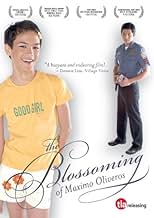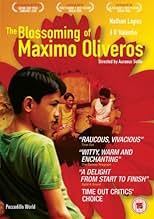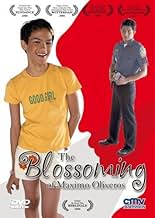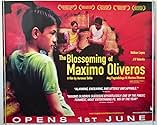CALIFICACIÓN DE IMDb
7.0/10
1.7 k
TU CALIFICACIÓN
Agrega una trama en tu idiomaA young boy falls in love with a handsome policeman who is investigating his family's criminal activities.A young boy falls in love with a handsome policeman who is investigating his family's criminal activities.A young boy falls in love with a handsome policeman who is investigating his family's criminal activities.
- Dirección
- Guionista
- Elenco
- Premios
- 24 premios ganados y 28 nominaciones en total
JR Valentin
- Victor Perez
- (as J.R. Valentin)
Jett Desalesa
- Leslie - Maxi's friend
- (as Sir Jett Desalesa)
- Dirección
- Guionista
- Todo el elenco y el equipo
- Producción, taquilla y más en IMDbPro
Opiniones destacadas
Absolutely delightful film, its story centering around Maxi (Nathan Lopez), a beguiling 12 year old boy who wants to be a girl, and his various flirtations, including an unlikely one with a rookie cop on the neighborhood beat. Maxi's Dad and two older brothers are criminal lowlifes capable of very bad deeds, including murder, but they are entirely devoted to Maxi, who cooks and keeps house for them (Mom died a few years before). The feeling is mutual: as Maxi says, there may be a lot of crooked people around, but he's only got one Dad.
The film is chock full of arresting street scenes in metropolitan Manila, and intriguing tensions among the principals. It is most refreshing to see loving, tender feelings binding a marginal family together, rather than the usual melodramatic dysphoria that infects, but does not inform, many movies about the underclass. (This year's "Quinceañera" is another film that plays up the positive aspects of family life in L.A.'s Echo Park Mexican-American barrio.) An exotic, spellbinding, bounteous bouquet of a film. Won several awards at the Berlin and Cinemalaya Film Festivals, among others, and was nominated for the Grand Jury Award this year at Sundance. (In Filipino, Tagalog & English) My grades: 8.5/10, A- (Seen on 11/21/06)
The film is chock full of arresting street scenes in metropolitan Manila, and intriguing tensions among the principals. It is most refreshing to see loving, tender feelings binding a marginal family together, rather than the usual melodramatic dysphoria that infects, but does not inform, many movies about the underclass. (This year's "Quinceañera" is another film that plays up the positive aspects of family life in L.A.'s Echo Park Mexican-American barrio.) An exotic, spellbinding, bounteous bouquet of a film. Won several awards at the Berlin and Cinemalaya Film Festivals, among others, and was nominated for the Grand Jury Award this year at Sundance. (In Filipino, Tagalog & English) My grades: 8.5/10, A- (Seen on 11/21/06)
10fjgebaue
I saw this at the San Francisco Film Festival... it is really a beautifully done film that has both good laughs and good drama. It is amazing that this film was produced for about $10,000 US and was shot in 13 days in the director's own hometown neighborhood. This film will surprise you with its frankness and honesty, and I can't recommend it highly enough. I've seen plenty of boring and trite or irrelevant films at film festivals. This film is certainly worthy of your time and may change the way you look at poverty, at gay people, and at the nature of families and the love of parent and child, sibling and sibling. It is also a wonderful "barrio" film in the tradition of "Macho Dancer," but I think it does that film one better. I would definitely see this movie once or twice again. It is easily as good as any Hollywood film.
One can seldom discuss gay Filipino films without mentioning the Lino Brocka classic, "Macho Dancer". For a long time the film lorded over all the others in gay filmdom (or is it 'film gaydom'?). Sure there were competent ones like "Aishite Masu" and "Markova: Comfort Gay" but they were never thisclose to "Macho". Could "Ang Pagdadalaga ni Maximo Oliveros" finally be the one true contender for the throne?
Director Aureus Solito and writer Michiko Yamamoto have crafted a very likable coming of age story. The treatment of Maximo Oliveros' (Nathan Lopez) homosexuality is unique and refreshing for it is never questioned nor made an issue, just a fact as true as the sky is blue. It's a huge credit to the filmmakers for not resorting to easy laughs at the expense of gay characters. Camp is absolutely present but it's never overdone. In fact, I think one of the main reasons why the film works so well is because the whole film isn't overdone. The filmmakers know when to pull back just before a scene turns mushy or heavyhanded. Even something as elaborate as the mini-pageant scene is cut long enough to avoid unnecessary melodrama.
One of the film's most interesting aspects for a lot of viewers is the seemingly astonishing possibility that an effeminate homosexual can exist relatively peacefully in the slums, aka Hoodlum Central. Although I haven't seen this myself, I am convinced that cultural mores make this scenario very possible. Despite the influence of homophobic Roman Catholicism, the general mood in the country is situated somewhere between amusement, acceptance, and tolerance (though not immune to occasional spurts of homophobia). Let us not forget that pre-Spanish Philippine culture respected the 'babaylan', a gay priest(ess) of sorts.
The homoerotic love angle is beautifully handled, in my opinion. To start with, the leads are perfect. Lopez carries the film as Maximo while JR Valentin as the cop is hunky yet brotherly, respectable as necessary but not too antiseptic. You get a sense of hero worship, excessive caring, and strong attraction from the side of Maximo while from the other side you see a fraternal sense of caring, naivete, and a culturally-imbibed politeness that supersedes any possible homophobia. There's also a delicious hint of ambiguity in his sexuality. There are a number of memorable scenes between the two, but a brief, well-handled, but highly erotic one (which, under a weaker filmmaker, could've easily bordered on pedophilia considering Maximo's age) and the emotionally satisfying ending stand out the most.
Despite the fact that Maximo Oliveros is unapologetically gay the film isn't strictly gay-themed unless you consider puppy love, unrequited love, familial obligations, and economic struggles as such.
It was a proud moment to watch a Filipino film in the prestigious Lincoln Center New Films/New Directors series in New York City. It was icing on the cake to see someone from the Univ. of the Philippines do good, in the gay arena, no less. "As good as Hollywood films"? I say better. When did Hollywood ever show us a coming of age story with a gay lead character?
Director Aureus Solito and writer Michiko Yamamoto have crafted a very likable coming of age story. The treatment of Maximo Oliveros' (Nathan Lopez) homosexuality is unique and refreshing for it is never questioned nor made an issue, just a fact as true as the sky is blue. It's a huge credit to the filmmakers for not resorting to easy laughs at the expense of gay characters. Camp is absolutely present but it's never overdone. In fact, I think one of the main reasons why the film works so well is because the whole film isn't overdone. The filmmakers know when to pull back just before a scene turns mushy or heavyhanded. Even something as elaborate as the mini-pageant scene is cut long enough to avoid unnecessary melodrama.
One of the film's most interesting aspects for a lot of viewers is the seemingly astonishing possibility that an effeminate homosexual can exist relatively peacefully in the slums, aka Hoodlum Central. Although I haven't seen this myself, I am convinced that cultural mores make this scenario very possible. Despite the influence of homophobic Roman Catholicism, the general mood in the country is situated somewhere between amusement, acceptance, and tolerance (though not immune to occasional spurts of homophobia). Let us not forget that pre-Spanish Philippine culture respected the 'babaylan', a gay priest(ess) of sorts.
The homoerotic love angle is beautifully handled, in my opinion. To start with, the leads are perfect. Lopez carries the film as Maximo while JR Valentin as the cop is hunky yet brotherly, respectable as necessary but not too antiseptic. You get a sense of hero worship, excessive caring, and strong attraction from the side of Maximo while from the other side you see a fraternal sense of caring, naivete, and a culturally-imbibed politeness that supersedes any possible homophobia. There's also a delicious hint of ambiguity in his sexuality. There are a number of memorable scenes between the two, but a brief, well-handled, but highly erotic one (which, under a weaker filmmaker, could've easily bordered on pedophilia considering Maximo's age) and the emotionally satisfying ending stand out the most.
Despite the fact that Maximo Oliveros is unapologetically gay the film isn't strictly gay-themed unless you consider puppy love, unrequited love, familial obligations, and economic struggles as such.
It was a proud moment to watch a Filipino film in the prestigious Lincoln Center New Films/New Directors series in New York City. It was icing on the cake to see someone from the Univ. of the Philippines do good, in the gay arena, no less. "As good as Hollywood films"? I say better. When did Hollywood ever show us a coming of age story with a gay lead character?
Just by watching this film, one can understand inside-out about what's going on in a so-called developing country. All the odds. All the blurry lines. And the great parallel of morality and survivability. This film tells a life story well beyond homosexuality and human attraction, as indicated in the camouflage. Maximo or Maxi represents every soul on earth, who needs time, and perhaps a tragedy, to comprehend the life bestowed on him by others, and another life he may be given a chance to choose. His criminal but ultimately decent family is on one side, and the naively honest and devilishly handsome police officer on the other. And, to cry out loud, he is only 12 years old, living in a slum area and without a mother. Forcing him to choose is cruel. I myself am from Thailand. Not so different from the Philippines portrayed excellently here. I think I can relate very well to the sense of trapping one may feel, having born into a brothel of life like that. I dare an inexperienced westerner to predict the film plot, and how it might end. I do not think you can figure out one move to another. This film is honest, with the story well-told and incredibly fair. It should be nominated for major film awards on behalf of ASEAN, as opposed to the Philippines alone, as it tells an ASEAN story, except for Singapore, as few films can. Maximo walks past the charming Victor on his way to re-enter school. Believe it or not, it is indeed a hard decision to make, in a society less than fair and democratic. He is indeed blossoming.
Although the main character is gay, this is not a gay film. The beauty of the film is that it does not make fun of the gay character. Maxi is well-loved and accepted by his family and the community.
There is plenty of humor but this light treatment of the story does not at all trivialize the message that the film wants to bring across to the audience. Scriptwriter Michiko Yamamoto who also wrote the award-winning "Magnifico" has improved her skill in storytelling and is not at all melodramatic this time. She has done away with subplots that don't move the main story much, a weakness of many Filipino scriptwriters who want to tell everything, including the entire history of the Philippines, in one movie. Her characters are all balanced no one is all-evil or all-saint. The most touching scenes are those that show the tenderness of Maxi's tough-guy family to him. However, there are technical glitches that need to be fixed, and with digital technology editing may still be possible, e.g. scenes that are too dark or the screen going black for too long, making the oldies in the audience worry that perhaps the "lagarista" has been caught in traffic with the next roll of film. It is not often that Filipinos abroad get to see a rare gem like this film. Thanks to digital film-making and indie cinema and the film festivals in many countries.
There is plenty of humor but this light treatment of the story does not at all trivialize the message that the film wants to bring across to the audience. Scriptwriter Michiko Yamamoto who also wrote the award-winning "Magnifico" has improved her skill in storytelling and is not at all melodramatic this time. She has done away with subplots that don't move the main story much, a weakness of many Filipino scriptwriters who want to tell everything, including the entire history of the Philippines, in one movie. Her characters are all balanced no one is all-evil or all-saint. The most touching scenes are those that show the tenderness of Maxi's tough-guy family to him. However, there are technical glitches that need to be fixed, and with digital technology editing may still be possible, e.g. scenes that are too dark or the screen going black for too long, making the oldies in the audience worry that perhaps the "lagarista" has been caught in traffic with the next roll of film. It is not often that Filipinos abroad get to see a rare gem like this film. Thanks to digital film-making and indie cinema and the film festivals in many countries.
¿Sabías que…?
- TriviaJoey Pepe Smith who plays the piano man being teased by the kids is the one who scored the film.
- ConexionesReferenced in Ako ang simula: The ABS-CBN News and Current Affairs Yearend Special (2006)
- Bandas sonorasMy Country, My Philippines
Written and Performed by Yoyoy Villame
Selecciones populares
Inicia sesión para calificar y agrega a la lista de videos para obtener recomendaciones personalizadas
- How long is The Blossoming of Maximo Oliveros?Con tecnología de Alexa
Detalles
- Fecha de lanzamiento
- País de origen
- Sitios oficiales
- Idiomas
- También se conoce como
- The Blossoming of Maximo Oliveros
- Locaciones de filmación
- Productoras
- Ver más créditos de la compañía en IMDbPro
Taquilla
- Total en EE. UU. y Canadá
- USD 28,041
- Fin de semana de estreno en EE. UU. y Canadá
- USD 6,690
- 24 sep 2006
- Total a nivel mundial
- USD 38,691
- Tiempo de ejecución1 hora 40 minutos
- Color
Contribuir a esta página
Sugiere una edición o agrega el contenido que falta

Principales brechas de datos
By what name was Ang pagdadalaga ni Maximo Oliveros (2005) officially released in Canada in English?
Responda
























